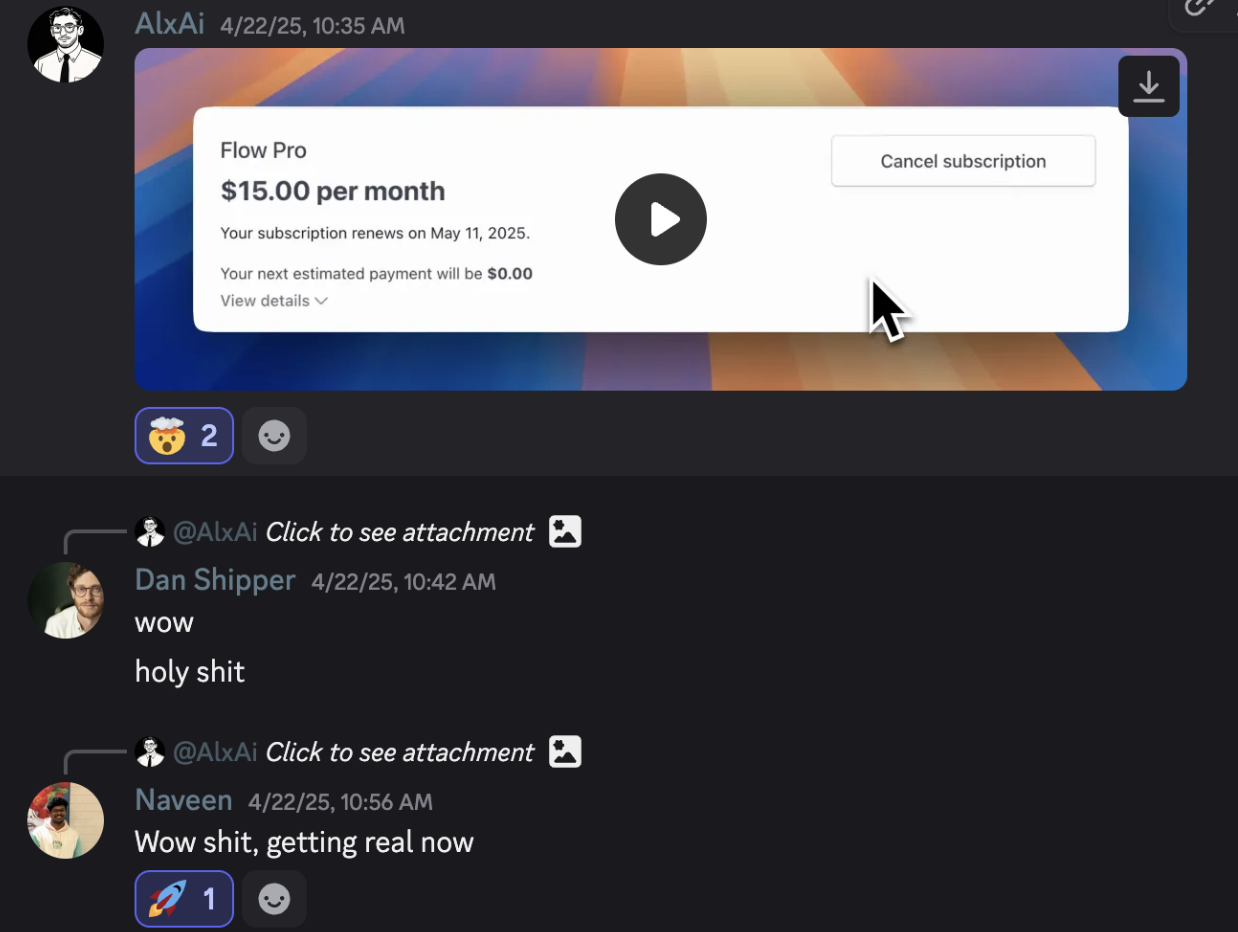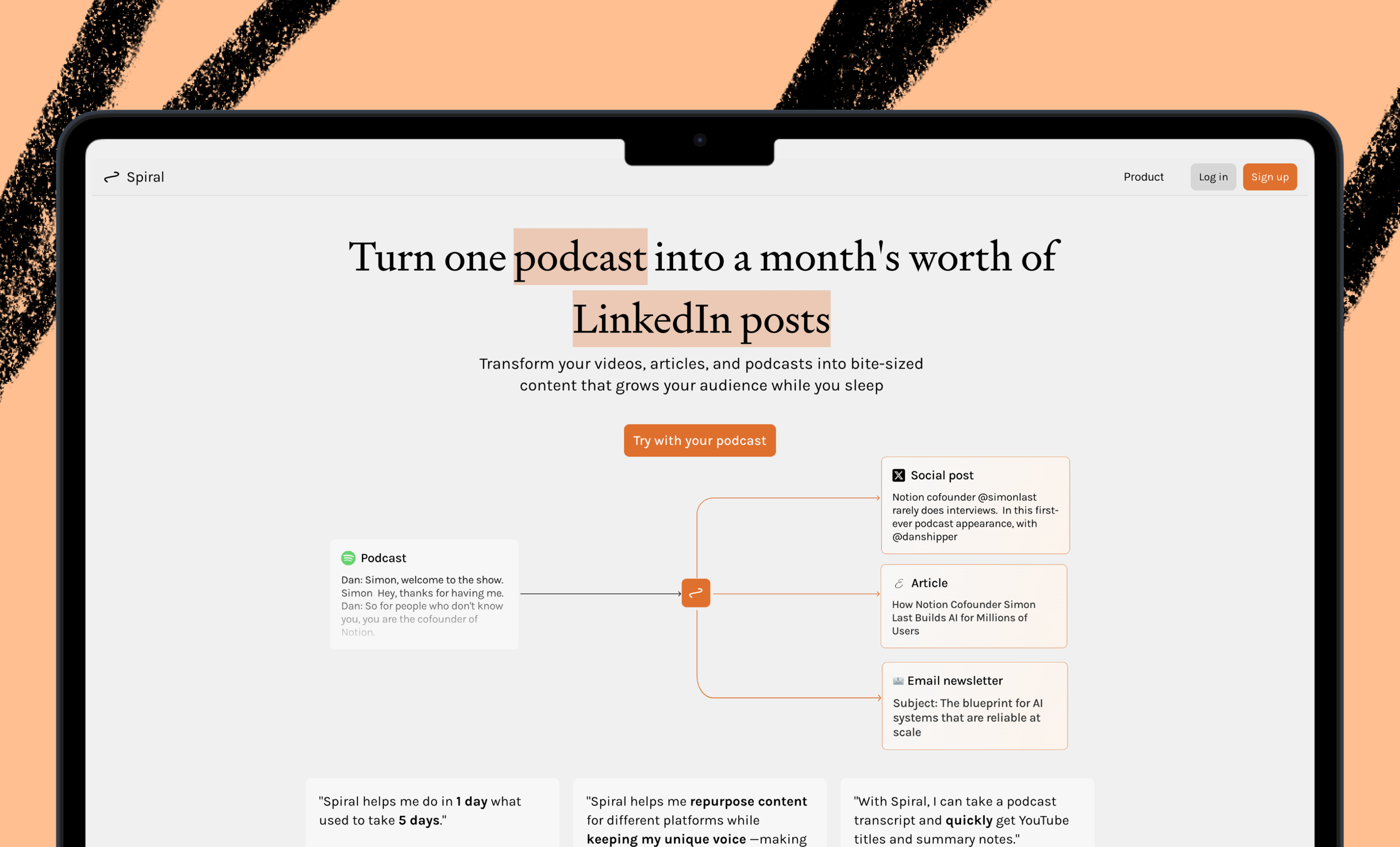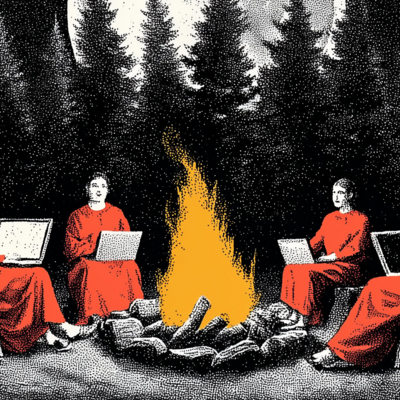.png)
Was this newsletter forwarded to you? Sign up to get it in your inbox.
I spent six months building sophisticated AI products that users tried once and forgot. Then a throwaway weekend build became the one people couldn’t stop talking about—or talking to.
First there was TLDR, an AI podcast generator: 10 weeks of work, great initial response, zero returning users. Then there was Kairos, an AI reading app: 1,000 downloads on day one, ghost town by day three. Next was Unwrite, a Grammarly alternative: 200 users, but only 50 daily interactions total.
The idea that became Monologue was different. It was barely more than a hack: Press a key, start talking, and it transcribes your voice into text. But by day two, two users were using it 200 times per day.
This is a paradox entrepreneurs know too well: We pour months into polished products with elegant architectures and thoughtful user journeys, only to watch them die on day two. Meanwhile, the hacky prototype you're embarrassed to show becomes the thing people message you in all caps about when it breaks for five minutes. After building three failures at Every—products that looked promising on launch day and faltered shortly after—I learned that launch day lies and day two tells the truth.
It didn’t matter how sophisticated or robustly featured the product was. Instead, I was solving a problem so urgent that people would use a broken prototype 100 times before lunch rather than wait for the polished version.
Building Monologue taught me something I wish I'd known six months and three dead products ago: We're all measuring the wrong things on the wrong day.
The graveyard of good ideas
When I joined Every's entrepreneur in residence (EIR) program, I came in with a plan. Find the big idea. Go all-in. Ship something meaningful. I had a list of concepts ready, and one stood out: Turn meeting notes into podcasts you could listen to while commuting. At the time, Google's NotebookLM had gone viral for turning documents into surprisingly engaging audio, so we thought we should apply the same idea in a company setting.
We called it TLDR.
I spent 10 weeks building it. I dove deep into podcast structure, studied how Gimlet Media crafted hooks, and learned about intros and outros. I was terrible at writing, so I obsessed over prompts that could generate engaging audio. By December, I had a polished product.
Launch day felt promising. Every CEO Dan Shipper wrote about it, we got interest from prospects, and people said it was "cool" and "innovative." But internally, our team didn't touch it. Externally, it didn't fit cleanly in Every's bundle model, and there were zero returning users. The harsh truth emerged: No one wanted to relive meetings as audio. Reading a summary took 30 seconds; listening to AI-generated recap took 10 minutes.
TLDR taught me lesson one: Clever doesn't equal useful.
I pressed on. After taking two weeks off to backpack through Thailand, I came back with a refined philosophy. Instead of asking "What's the big market opportunity?" I started asking "What would our team use every day?" If the internal team adopts something naturally, it’s a strong signal that our community—an extension of that team—will too.
With that framework, I built Kairos.
Kairos was my attempt to make reading less solitary: an AI reading companion that let you highlight text and ask questions in real time. I built it in two weeks, wrote about it with staff writer Katie Parrott, and launched it in February. One thousand people installed it immediately.
Day one felt electric. Day three was silent.
The novelty was there—people loved seeing AI answer questions about their books. But the friction was brutal. You had to upload your own books, and digital rights management made that painful. Even when people enjoyed the experience, they didn't come back. The structural barriers killed the habit before it could form.
Kairos taught me lesson two: "Cool" and "durable" are different animals.
Then came Unwrite: a Grammarly alternative powered by LLMs that could adapt to your writing style. I’d seen chatter online about Grammarly’s struggle to understand writing style and laments that the company had moved upmarket to big companies, leaving solo users behind. The problem felt clear and specific. I spent about 10 weeks building iOS and Mac versions, complete with system integrations and keyboard shortcuts. Two weeks into the build, we released the app and onboarded our first 200 users.
People tried it. A few stuck around. Most drifted away. Fifty uses from 200 users doesn’t exactly scream “daily driver.” In user interviews, two patterns emerged. First, text that reads too perfectly doesn't feel authentic—your voice disappears. Second, many people had shifted to composing directly in ChatGPT, reducing the need for a separate grammar tool.
Unwrite taught me lesson three: User habits evolve faster than product development cycles.
By the time I demoed Unwrite to the Every team during a Friday “show and tell" with our product studio, I'd invested six months across three products. On paper, I had nothing to show for it. Three launches, three polite receptions, three day-two dropoffs.
Then, an afterthought, I showed them the tool that would become Monologue.
Finding product-market fit on a Zoom call
I’d thrown it together over a long weekend: a simple dictation app that transcribed your voice and let you talk to AI. Nothing revolutionary—after all, other dictation solutions exist, but they require setup, subscriptions, and cognitive overhead.
The (Zoom) room changed.
Cora general manager Kieran Klaassen pulled up his laptop and showed us his hacky Python script—a local Whisper model he'd cobbled together for dictation but was dissatisfied with because of the lag and clunky workflow. "If you give me the build," he said, "I'm going to stop using my crappy version and start using yours."
By Monday morning, Kieran was using it 100 times a day, and Cora engineer Nityesh Agarwal nearly as often. When the shortcut—the core experience of being able to capture speech with a single button—broke briefly, Kieran's Discord message came in all caps: "IMMEDIATE CHURN." It was a joke, but beneath the joke was a signal: My weekend hack had already slipped into his daily workflow.
Fellow EIR Edmar Fereirra came out of his “coding cave” just to say the app was great. By the time Wispr Flow power user Alex Duffy shared in Discord that he was canceling his subscription and switching to my app, I realized: This could be it.
Following the signal
The contrast between Unwrite's reception and the dictation hack's adoption revealed what I'd been missing in a bigger-picture sense. I'd been optimizing for launch day—polished demos, compelling narratives. But launch day lies. People applaud clever concepts and say encouraging things. They don't always come back.
Day two tells the truth. On day two, novelty wears off and social pressure disappears. People either reach for your tool because it fits how they already work, or they forget about it entirely.
This discovery flipped my approach. Instead of planning products, I started running experiments. Every COO Brandon Gell set a metric for the studio: Ship as many experiments as possible each quarter. That constraint made me think in terms of quick tests rather than perfect launches, and I started operating by a new set of rules:
- Two weeks maximum for version one. Speed reveals truth faster than polish. TLDR took 10 weeks and died on day two. Kairos took two weeks and failed more quickly, but taught me more.
- Demo everything, especially the hacks. Your best idea might be hiding in your "also built this." The throwaway hack I showed after my polished Unwrite demo generated all the energy.
- Follow usage, not compliments. "This is amazing!" means nothing. Daily active use means everything.
- Watch the internal daily-use bar. If your team doesn't adopt it naturally within two weeks, kill it or change it. We were builders building for builders, and our daily habits were a reliable proxy.
- Ship to learn, not to win. Each experiment teaches you something that compounds your knowledge. TLDR, Kairos, and Unwrite felt like failures individually, but they were the path to Monologue.
The compound effect
Three months after that Friday demo, Monologue has become something I couldn't have planned. We've got thousands of users talking to their computers dozens of times per day. People are using it to capture ideas, draft emails, and debug code by talking through problems.
None of this would have been possible without AI. I built four products in under a year as a solo developer—something unthinkable even two years ago. But AI made failure cheap enough that I could finally afford to learn what works.
None of it would have been possible without the failures, either. TLDR gave me familiarity with engineering for audio, Kairos gave me interaction patterns, Unwrite gave me system shortcuts. Monologue was those pieces finally snapping together.
Building Monologue has made me realize something about the way we build with AI: When everything becomes easy to make, nothing becomes easy to love. The differentiator is whether something fits so naturally into people's existing habits that removing it feels like amputation.
That fit can't be designed in advance. It emerges from the intersection of capabilities you've collected, the pressure points where habit and frustration collide, and timing you can't control. My job wasn't to predict that intersection—it was to stay ready for it.
So here's my challenge: Stop building for launch day. Build for day two. Skip the perfect demo and ship the rough prototype. Ignore the compliments and watch the usage patterns. Follow the signal that matters—the one that shows up when the applause dies down and people have to decide whether to open your app again.
Naveen was a guest on the latest episode of AI & I.
Thanks to Katie Parrott for editorial support.
Naveen Naidu is the general manager of Monologue.
To read more essays like this, subscribe to Every, and follow us on X at @every and on LinkedIn.
We build AI tools for readers like you. Write brilliantly with Spiral. Organize files automatically with Sparkle. Deliver yourself from email with Cora. Dictate effortlessly with Monologue.
We also do AI training, adoption, and innovation for companies. Work with us to bring AI into your organization.
Get paid for sharing Every with your friends. Join our referral program.







.28.41_AM.png)


 Katie Parrott
Katie Parrott
Comments
Don't have an account? Sign up!